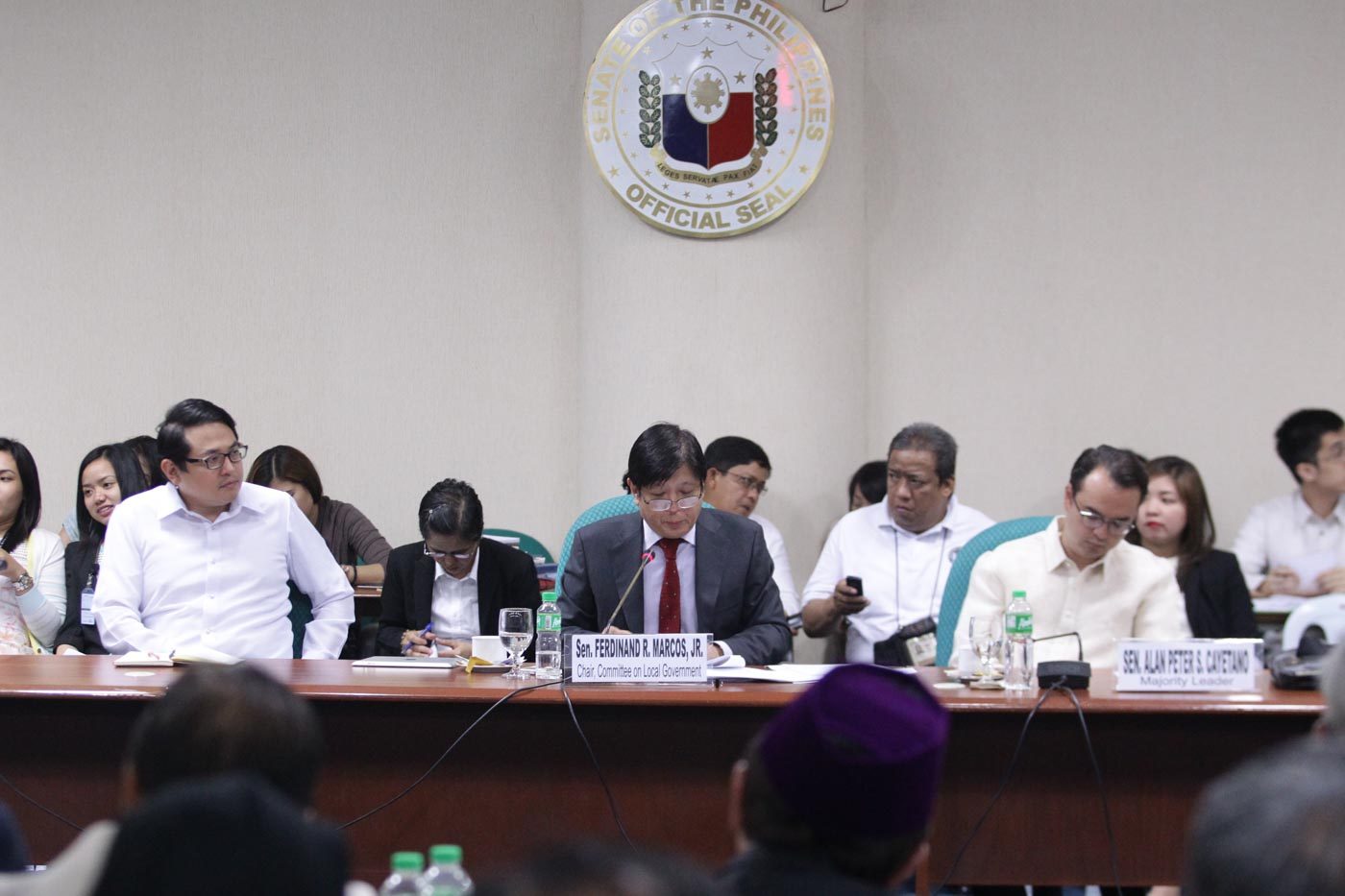SUMMARY
This is AI generated summarization, which may have errors. For context, always refer to the full article.

MANILA, Philippines – How is the substitute bill for the proposed Bangsamoro basic law (BBL) shaping up at the Senate?
Since Senator Ferdinand Marcos Jr formally rejected the Bangsamoro bill on June 3 and stated that he will file a substitute bill, a number of proposals from him and other senators have been put forward through media statements and interviews.
In a June 18 Kapihan press conference at the Senate, Marcos said close to 50% of the bill, which implements the peace deal between the government and the Moro Islamic Liberation Front (MILF), will be revised.
Here is a rundown of current proposals at the Senate:
- One proposal is to just amend the present organic act for the Autonomous Region in Muslim Mindanao to avoid issues on constitutionality and make it easier to beat the target deadline to pass the law by October.
- Senate President Franklin Drilon shares the sentiment of many senators that the so-called opt-in provision should be removed from the BBL. Speaker Feliciano Belmonte Jr and the Malacañang-backed Citizens’ Peace Council have the same position. The provision allows areas sharing a common border with the proposed Bangsamoro core territory to join the plebiscite for possible inclusion through a petition signed by at least 10% of voters.
- On the form of government: Weeks after delivering a scathing speech criticizing the Bangsamoro bill for not being inclusive, Marcos backtracked and said in a June 16 television interview that his substitute bill will “adhere to the original intent of the peace agreement” between the government and the MILF. One of the key features that Marcos considers keeping is the proposed parliamentary form for the Bangsamoro government. This is despite constitutional issues raised against it in a report signed by 13 senators.
“The proposed parliamentary form of government for the Bangsamoro government is very fundamental to the proposal of the MILF so if it is subjected to a major revision they might not accept our version altogether,” he said.
- Marcos, however, expressed reservations about granting the Bangsamoro government “exclusive powers” that would empower it to create its own tax code, and trade and investment laws.
“The Bangsamoro government could in the future have a policy direction that is substantially different from, or at a great disconnect with, that of the Philippine government,” he said.
- Marcos said he will consider the role that the Moro National Liberation Front and the traditional Sulu Sultanates will play in the Bangsamoro parliament.
- Marcos said the jurisdiction of courts in the Bangsamoro, which he described as “very confusing” should be clarified. The BBL seeks to create a Shari’ah High Court, which will apply only to Muslims, as well as establish a tribal justice system and an alternative dispute resolution system. Local courts will also remain. All courts will be under the jurisdiction of the Supreme Court, the government peace panel said in earlier congressional hearings.
- On the decommissioning of MILF firearms and forces – Marcos said he intends to make it “definite so it is not dependent on events” under the law. Senator Francis Escudero has also vowed to press for the inclusion of the decommissioning process in the BBL. The decommissioning process under the peace deal is staggered and depends on the implementation of political commitments.
- Marcos has been critical of provisions giving the Bangsamoro parliament control and supervision over inland waters. This includes Lake Lanao – a resource that provides over 50% of the energy supply of Mindanao. Lake Lanao is located inside the Lanao del Sur province, one of the proposed core areas of the Bangsamoro.
“What would happen if Lake Lanao is allowed to be claimed as part of the ‘Bangsamoro territory?’ Of course, control over it would be divested from the National Power Corporation (NPC) and transferred to the Bangsamoro government,” Marcos said.
- On fiscal autonomy: Marcos said “safeguards” or checks and balances on how proposed funds to be given to the Bangsamoro government would be accounted for are lacking in the BBL
- Senator Ralph Recto suggested the inclusion of “Moro Development Goals” or a checklist of development targets on poverty, education and health.
- Marcos said he will also scrutinize provisions giving the Bangsamoro government control over natural resources within its area.
- Like the House of Representatives, Marcos has expressed concerns about the constitutionality of creating special branches of constitutional bodies in the Bangsamoro, such as the Commission on Elections, Commission on Audit, Commission on Human Rights and the Civil Service Commission.
- Senators have also expressed reservations about provisions allowing the Bangsamoro to retain taxes collected within its jurisdiction. Lawmakers earlier said this could lead to “double” collections since the Bangsamoro government is already allowed to ge 75% of national taxes collected within its territory under the bill.
Congress is in recess until the final State of the Nation Address of President Benigno Aquino III on July 27.
Marcos said he is using the time to craft the substitute bill. – Rappler.com
Add a comment
How does this make you feel?
There are no comments yet. Add your comment to start the conversation.